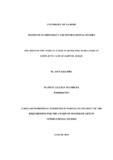| dc.description.abstract | More than ten years since the Darfur conflict erupted, there is hardly any comprehensive
peace agreement involving the different rebel groups and the Government of Sudan. The
African Union under the auspices of the African Peace and Security Architecture has
been undertaking mediation efforts between the different factions of the Darfur rebels and
the Government of Sudan. It has been contended in this study that the methodology of
bringing lasting peace in the Darfur region is at the core of the challenge facing the
African Union (AU). Despite the forthright initiatives of the AU in conflict resolution,
incidents of violent conflicts have persisted in Darfur.
The general objective of the study was to analyse and document the gains and limitations
of mediating processes in the African conflict resolution in Darfur, in Western Sudan
region.The research was guided by the human needs theory which entailed mutual
combination of factors used by the African Union and other actors on the relevance of
mediation by dealing with the conflict cycle from the structural causes of the struggle to
its resolution and the assurance of a peaceful conflict resolution in the Darfur region.
The study concludes that the African Union lacks the institutional capacity to mediate the
Darfur conflict and that competing mediation initiatives hinder peace processes in Darfur.
Mediation deadlines to peace agreements were also identified as an obstacle to lasting
peace in Darfur.
The study recommends the need for the establishment of an AU Mediation Unit, which
should give prominence to restoring security in Darfur region and compliment the
Continental Early Warning Systems. Other recommendations included adoption of a
problem –solving approach in negotiations, inclusive future Darfur peace talks as well as
getting other external actors such as China to weigh in any future mediation attempts. In
multiethnic society, the African Union as well as other actors should ensure they use a
comprehensive peace approach that appreciates the diversity of cultural world views. | en_US |

